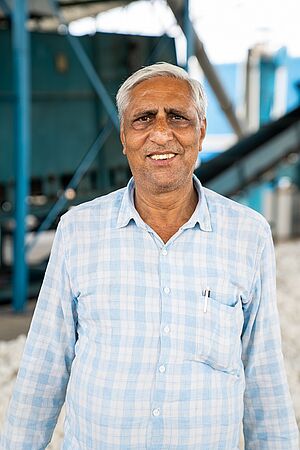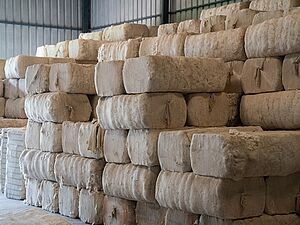"I hope more people start to see that organic agriculture needs to be our future."
Faces of Organic Cotton (3/11)
Vasudev Bajad, Cotton Purchase & Ginning Manager at Remei India
"Ever wondered how the fruit of a cotton plant becomes your t-shirt? You are at the right place. Here is where the first steps happen. We only process organic cotton, so the first thing we do when the cotton arrives is testing for contamination with genetically modified cotton and remove any contaminated batches. We separate the different qualities; not all cotton can meet the highest quality standards. In our ginnery we separate the cotton lint from the seeds, clean the lint and press it into bales. In the end, you get 2 bales of lint out of one ton of picked cotton. You would imagine lint bales to be all fluffy and light but one bale weighs 165 kilograms and is as hard as a brick.
Originally, I am from Punjab, the Indian state in the north eastern part of the country. I worked at a ginnery there and my boss liked my work, so when a new ginnery here in Madhya Pradesh opened he recommended me as head of production. I took the opportunity and moved all the way here, more than 1,000 km from where I grew up. Initially I felt lonely here and wanted to go back. The language barrier was a problem for me. Though most people in India speak Hindi, the local languages are those that people feel most comfortable speaking. With time I learned the local language, and though I still sometimes switch back to speaking Punjabi I feel at home here now. We grew our family here, our friends are here and I got some land of my own where I practice organic farming growing rice, wheat and maize.
When I moved here I thought organic agriculture was an outdated and backward way of farming. But I learnt to love the land here where the air is fresh and organic agriculture is strong. In Punjab the green revolution was very successful: production is high, the land is worked with tractors and farmers use all kinds of chemical inputs. But I feel the air is polluted, soils are degrading and the water levels are going down. I hope people start to see the difference -that they see how organic agriculture is better for the environment, how it improves once degraded soils, how it is beneficial for insects, better for the human health and how it increases all life on the farm. I hope more people start to see that organic needs to be our future."
Vasudev Bajad is 60 years old and lives in Kasrawad. He has worked at an organic cotton ginning and pressing facility of Remei India Ltd for 27 years.
More portraits
fibl.org: Faces of Organic Cotton








